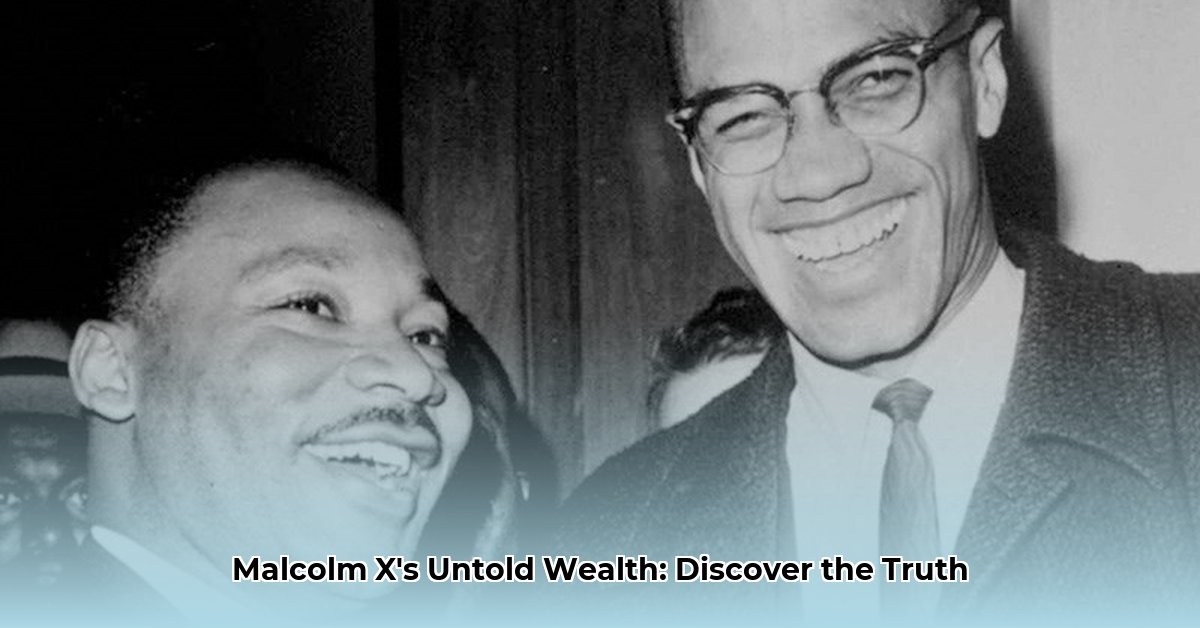
Malcolm X's life story is a powerful narrative of unwavering dedication to civil rights, punctuated by a persistent struggle against financial hardship. His estimated net worth at the time of his assassination, approximately $150,000 (adjusted for inflation), belies the enormity of his influence and the sacrifices he made. This wasn't simply a matter of accumulating wealth; it was a testament to his commitment to social justice, a commitment that often meant living with remarkably little.
From Rags to Revolution: A Financial Journey
Malcolm X's early life was marked by profound poverty. Born in Omaha, Nebraska, to a struggling family, he experienced firsthand the crushing weight of racial inequality and economic hardship. This formative experience shaped his worldview, fueling his later activism and providing context for his understanding of systemic injustice. How could such debilitating poverty not inform his fierce dedication to equality? He witnessed firsthand how poverty denied opportunities, perpetuating cycles of disadvantage. The lack of access to basic necessities profoundly shaped his perspective.
His association with the Nation of Islam brought a degree of financial stability, a stark contrast to his previous struggles. This security, however, came at a considerable cost. His financial destiny became intertwined with the organization's fortunes, limiting his personal financial autonomy. As a minister, his income was directly tied to the Nation of Islam's success. Professor Henry Louis Gates Jr., Harvard University, notes, "Malcolm's financial dependence on the Nation of Islam highlights the complexities of his journey, a necessary step for some, but a limitation for others." This represents a key debate among historians.
The Break: A Financial Earthquake
Malcolm X's highly publicized departure from the Nation of Islam in 1964 triggered a significant financial upheaval. He faced sudden instability and uncertainty, the daunting task of rebuilding his life and career independently. The FBI's intense surveillance, documented extensively in declassified files, likely hampered his ability to find secure employment and earn a stable income. This added immense pressure to an already precarious situation, and inevitably limited his financial prospects. This period dramatically underscores the inherent risks associated with outspoken dissent, especially for a Black activist in the 1960s.
The Power of Words: A Posthumous Fortune
The publication of his autobiography, The Autobiography of Malcolm X, stands in stark contrast to his modest lifetime earnings. Its phenomenal success fundamentally reshaped his financial legacy, providing a substantial income for his family, proving the enduring power of his words. This posthumous financial success is a testament to the lasting impact of his ideas and activism. While his lifetime net worth was relatively modest, his autobiography ensured his family's financial well-being long after his death.
Dr. Jelani Cobb, Columbia University, observes that, "The book's success transcended mere financial gain; it established Malcolm X as a significant intellectual and literary figure, solidifying his place in American history." His words continue to resonate, influencing discussions on social justice and racial equality.
Unraveling the Mystery: The Challenges of Historical Financial Reconstruction
Determining Malcolm X's precise net worth remains a challenge. While a general figure is widely accepted, detailed financial records from that era are incomplete and fragmented. This lack of precise data highlights the complexities of reconstructing the financial lives of historical figures, especially those who lived before widespread digital record-keeping. Any estimated figure should be considered an approximation, based on the available evidence.
The difficulty stems from various factors: privacy concerns, incomplete record-keeping practices common at the time, and the simple passage of time. Many historical records are lost or inaccessible, hindering the possibility of a definitive assessment.
A Legacy Beyond Dollars and Cents
Malcolm X’s financial legacy transcends mere monetary value. His life serves as a powerful reminder that true wealth is not solely defined by material possessions. His unwavering commitment to social justice, even when confronted with crippling financial hardship, showcases a life lived with unwavering purpose and conviction. His modest net worth, contrasted with his profound impact, challenges us to reconsider our priorities. His story inspires us to consider how a life lived for a greater cause can have significantly more value than material wealth. He chose a path of activism, even if it meant enduring considerable financial sacrifice. His life continues to inspire us to strive for a world of justice and equality.
Key Takeaways:
- Malcolm X's life demonstrates a powerful juxtaposition: immense social influence coupled with persistent financial instability.
- His unwavering dedication to racial equality frequently superseded personal financial gain.
- The Nation of Islam provided initial financial stability, but his separation drastically altered his circumstances.
- His autobiography became his most significant posthumous financial asset, a testament to the enduring power of his words.
- His struggles highlight the sacrifices many activists make, and the lasting impact of their work despite such hardships.